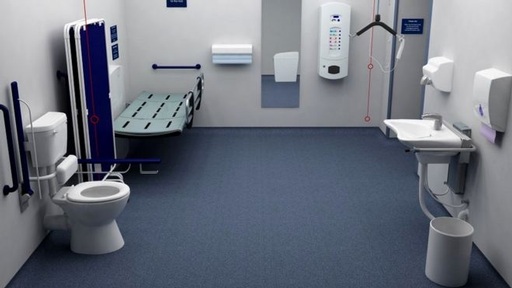Toilets for severely disabled to be compulsory in new public buildings
More than 250,000 severely disabled people will have greater access to public places after the government pledged to make Changing Places toilets compulsory in new buildings.

Changing Places toilets are larger accessible toilets for severely disabled people, with equipment such as hoists, curtains, adult-sized changing benches and space for carers.
There are more than 1,400 Changing Places toilets in the UK, up from just 140 in 2007, but more are needed to support more than a quarter of a million people who rely on them in the UK.
Shopping centres, supermarkets, cinemas, stadiums and arts venues are just some of the buildings which will be required to include at least one Changing Places toilet.
’People with disabilities’ should not have to suffer ‘discomfort, embarrassment or injury’
Minister for Care, Helen Whately said: “Dignity and independence is something many of us take for granted but can be a daily challenge of people with severe disabilities, especially when there is a lack of access to adequate toilet and changing facilities.
“All public spaces should cater for people with disabilities so they don’t have to suffer discomfort, embarrassment, or even injury without access to a Changing Place.
“Compulsory Changing Places in new public buildings is a major step in reducing the health inequalities faced by so many and will mean that future generations can live with independence, without having to worry about something as simple as basic amenities.”
The government estimates it will add the toilets to more than 150 new buildings a year. A £30 million fund to install Changing Places in existing buildings will open in the next few months.
'It’s torture when you see somebody else drink and you can’t'
In the absence of Changing Places facilities, disabled people and/or carers face:
• Limiting what they drink to avoid needing the toilet when they are out – risking dehydration and urinary tract infections.
• Sitting in soiled clothing or dirty nappies until a suitable toilet is found or they return home.
• Having to change a loved one on a dirty toilet floor.
• Manually lifting someone out of their wheelchair – risking safety.
• Reducing their time out of the house – restricting their social lives.

Fi Anderson lives in Bolton and is busy runs two charities whilst raising a family but because she cannot guarantee suitable toilets are available when she goes out, she limits herself to a 'sip or two' of water before she leaves the house.
Ms Anderson said: “My morning consists of having as little water as possible just to take my medication. I have a sip or two and then that will be it until I come home.
“It does become emotionally draining and physically quite taxing on your body. I have a constant dry mouth, I’m constantly thirsty and it’s torture when you see somebody else drink and you can’t.”
87 of England’s 118 service stations will have a Changing Places toilet in the early 2020s
The Department for Transport, in partnership with Muscular Dystrophy UK, has also announced £1.27 million to install 37 more changing places at service stations across England. These new facilities will give people with complex needs and their carers the confidence and freedom to make more journeys by road as coronavirus restrictions ease.
Rob Burley, director of campaigns, care and support at Muscular Dystrophy UK, said: “This is huge news for the quarter of a million people in the UK who need Changing Places toilets. Having access to these much-needed facilities increases independence and improves quality of life."
The legislation will make it easier for disabled people and their families to enjoy activities that many take for granted, whether that’s a day’s shopping or attending a concert.
Mr Burley said: “None of this would have been possible without the hard work of our wonderful campaigners. Thanks to everyone working together, we have taken a big step towards ensuring Changing Places toilets will be more widely available to everyone who needs them and tackling the exclusion people face.”
With this latest round of funding, 87 of England’s 118 service stations will be set to have a fully accessible Changing Places toilet in the early 2020s.
Transport Accessibility Minister Chris Heaton-Harris said: “It is hard to overstate the importance of something as simple as an accessible area for the over 250,000 people nationwide who have a severe disability.
“I want everyone to have the confidence to travel by any means so it is incredibly important for us to work with Muscular Dystrophy UK to provide Changing Places facilities at the majority of service stations in England.”
Latest News
 29-Jul-24
Dementia Bus gives carehome.co.uk staff insight into life with dementia
29-Jul-24
Dementia Bus gives carehome.co.uk staff insight into life with dementia
 27-Jul-23
UK's top home care agencies in 2023 revealed
27-Jul-23
UK's top home care agencies in 2023 revealed
 30-Nov-22
A quarter of older people keep their falls secret from family
30-Nov-22
A quarter of older people keep their falls secret from family
 29-Nov-22
'Covid-19 has not gone away' say terminally ill
29-Nov-22
'Covid-19 has not gone away' say terminally ill
 28-Nov-22
IT consultant who received poor care opens 'compassionate' home care business
28-Nov-22
IT consultant who received poor care opens 'compassionate' home care business